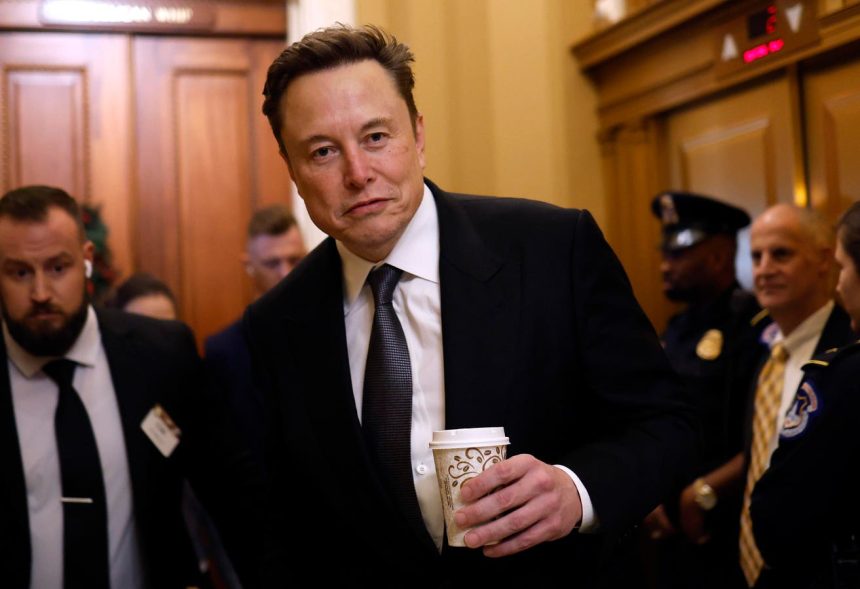Elon Musk’s foray into German politics has ignited a firestorm of controversy, marked by his explicit endorsement of the far-right Alternative for Deutschland (AfD) party. In an opinion piece published in the German newspaper Welt am Sonntag, Musk argued against the characterization of the AfD as “right-wing extremist,” citing the sexual orientation of its leader, Alice Weidel, as evidence. This intervention followed a provocative post on X (formerly Twitter), where Musk declared that “only the AfD can save Germany.” This statement drew immediate and widespread condemnation, with critics accusing him of supporting a neo-Nazi party, a charge he vehemently denies. Musk’s defense of the AfD hinges on his assertion that traditional German political parties have become complacent, leading to economic decline and a diminished global standing for the country. He posits the AfD as the sole force capable of reversing this perceived decline and restoring Germany to its former prominence.
Musk’s justification for his involvement in German politics stems from his business interests in the country, including a Tesla gigafactory located in Brandenburg. He contends that this economic stake grants him the right to express his political views, regardless of their controversial nature. The publication of the opinion piece sparked internal dissent within the newspaper itself. Eva Marie Kogel, the commentary section editor, resigned in protest against the decision to publish Musk’s piece, highlighting the polarizing nature of his intervention. While acknowledging the validity of Musk’s diagnosis of Germany’s political and economic challenges, Philipp Bugard, the editor-in-chief designate of Welt am Sonntag, countered by rejecting Musk’s proposed solution, labeling the endorsement of the AfD as “fatally false.” This internal conflict illustrates the profound division Musk’s pronouncements have created.
The controversy surrounding Musk’s endorsement of the AfD extends beyond Germany’s borders. Concerns have been raised about the potential influence of Musk’s political views, given his close relationship with former US President Donald Trump. Senator Chris Murphy, a Democrat from Connecticut, voiced these concerns, suggesting that Musk’s opinions often align with Trump’s and warning of the catastrophic implications if the United States were to officially support a neo-Nazi party in Germany. This apprehension stems from the perception that Musk serves as a conduit for ideas between the business world and the political sphere, particularly within the Republican party. Furthermore, JD Vance, the Vice President-elect, has also expressed support for the AfD, amplifying the resonance of Musk’s endorsement within certain political circles. This confluence of support raises questions about the potential for these views to gain broader traction.
The timing of Musk’s intervention coincides with the collapse of German Chancellor Olaf Scholz’s coalition government and the subsequent scheduling of a snap election. This political instability provides a backdrop for the AfD’s rise in popularity, capitalizing on public anxieties and offering seemingly decisive solutions. Musk’s op-ed was published in Welt am Sonntag, a newspaper owned by the Axel Springer media group, which also owns Politico. This media connection further amplifies the reach and impact of Musk’s message, ensuring its dissemination to a wider audience. The AfD’s platform centers on a hardline stance against immigration, a position that has drawn both support and strong criticism. Accusations of employing Nazi and white supremacist rhetoric have dogged the party, fueled by controversial campaign materials that play on xenophobic fears.
While Musk defends the AfD’s anti-immigration policies as “reasonable,” critics point to instances of inflammatory rhetoric that echo historical prejudices. The party’s use of racially charged imagery and slogans has raised serious concerns about its underlying ideology and its potential to incite further division within German society. Musk’s apparent downplaying of these concerns has fueled the criticism directed at him, with opponents arguing that he is normalizing dangerous ideologies. The broader context of Musk’s increasing involvement in political discourse adds another layer to the controversy. His frequent pronouncements on social and political issues, coupled with his close ties to prominent political figures, raise questions about his motives and the potential impact of his influence.
Musk’s defenders argue that he is simply exercising his right to free speech and engaging in open dialogue. Conversely, critics argue that his platform and reach amplify potentially harmful ideologies, requiring a more cautious and responsible approach. This debate highlights the complexities of navigating the intersection of business, politics, and social media in the modern era. The AfD’s platform is rooted in a nationalist and populist agenda, focusing on strict immigration control, skepticism towards the European Union, and a critical stance on climate change policies. While attracting some voters with these positions, the party’s rhetoric and affiliations have drawn sharp rebukes from across the political spectrum, raising concerns about its potential impact on German democracy and social cohesion.
Musk’s association with Trump, particularly his appointment to a government efficiency department after the 2020 election, further complicates the picture. Critics see this connection as evidence of Musk’s increasingly partisan political leanings and his willingness to align himself with controversial figures. This alignment amplifies the concerns about the potential for his views to influence policy decisions and shape public discourse in ways that could be detrimental to democratic values and international relations. The incident underscores the growing influence of tech billionaires in the political sphere and the potential for their personal beliefs to shape political narratives, both domestically and internationally. The controversy sparked by Musk’s endorsement of the AfD is a potent reminder of the complex interplay between business, politics, and free speech in an increasingly interconnected world.



